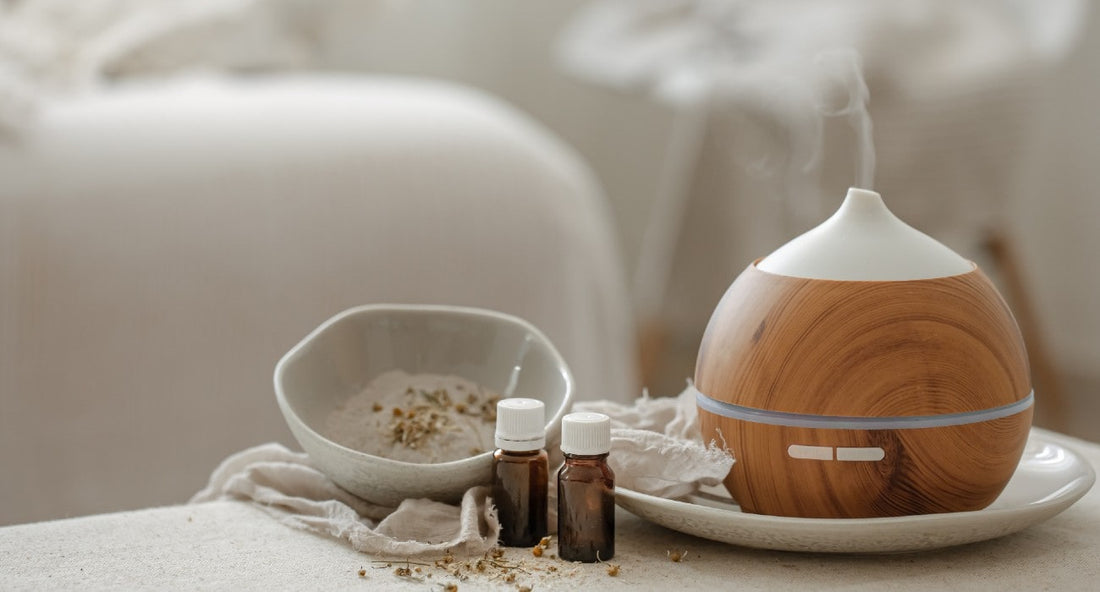The Benefits of Aromatherapy for Sleep: What Scents to Use and How

Sleep is crucial for our overall health and well-being as it allows our bodies to repair and rejuvenate, enhances cognitive function, and boosts our mood. Unfortunately, factors such as stress and anxiety can hinder our ability to get a good night's rest. Aromatherapy, on the other hand, is a natural and non-invasive approach to promoting relaxation and improving the quality of our sleep. In this article, we will discuss the different ways aromatherapy can benefit our sleep and explore the most effective scents to use, as well as the techniques for their application.
THE SCIENCE BEHIND AROMATHERAPY FOR SLEEP
For centuries, aromatherapy has been widely used for inducing relaxation and improving sleep. This practice involves using plant-based essential oils to create scents that can be both inhaled or topically applied. The scientific explanation behind the effectiveness of aromatherapy lies in its stimulation of the olfactory bulb via our nasal passage. The olfactory bulb is responsible for processing scents. When we inhale a scent, it travels through the nose and is detected by the olfactory receptors in the nasal cavity. These receptors send signals to the olfactory bulb, which is located in the brain's limbic system and is responsible for regulating emotions, memory, and behavior. This is why scents can have a powerful effect on our moods and emotions.
Another way aromatherapy works is by stimulating the release of certain neurotransmitters in the brain, such as serotonin and dopamine, which trigger feelings of relaxation and happiness. Additionally, certain scents can activate the parasympathetic nervous system that controls our breathing, digestion, and heart rate. These scents promote a state of rest and relaxation that is helpful for good sleep.
Uncommon fact: Did you know that the olfactory bulb is the only part of the brain that has direct access to the external environment? This means that scents can have a direct impact on our brains and emotions.
RESEARCH ON THE EFFECTIVENESS OF AROMATHERAPY FOR SLEEP
There is a growing body of research that suggests aromatherapy can be an effective way to improve sleep. According to a study published in the Journal of Alternative and Complementary Medicine, the lavender essential oil has an effect on improving sleep quality for individuals with mild insomnia. Additionally, separate research published in the Journal of Korean Academy of Nursing discovered that aromatherapy using lavender and bergamot essential oils could reduce anxiety and improve the sleep quality of patients in a cardiac ICU.
Other studies also suggest that aromatherapy could be beneficial for individuals dealing with sleep disorders such as sleep apnea and restless leg syndrome. One such study showed that inhaling a blend of lavender essential oil improved sleep quality and reduced sleep apnea symptoms for participants.
While further research is necessary to obtain a thorough understanding of the effectiveness of aromatherapy, these studies demonstrate that it can be a valuable tool in enhancing sleep quality and reducing stress.
BEST SCENTS FOR SLEEP
There are a variety of options available when it comes to the best scents for inducing sleep, each with their own qualities and advantages. Let's examine some of the best scents for sleep in more detail and discover what makes them so.
Lavender
It is one of the most popular scents for promoting relaxation and sleep. Its relaxing aroma has been demonstrated to lower heart rate, reduce anxiety symptoms, and enhance sleep quality. In fact, one study indicated that participants' general sleep quality increased when they inhaled lavender oil for just 30 minutes before bed.
But why is lavender so effective for sleep? According to one idea, it functions by increasing the amount of slow-wave sleep, sometimes referred to as deep sleep, which is essential for the body's repair and renewal. Another theory is that lavender stimulates the release of certain neurotransmitters, such as serotonin and GABA, which have a calming effect on the body.
Chamomile
Another popular scent for promoting relaxation and sleep is chamomile. This gentle, floral scent has a soothing effect on the mind and body, making it an ideal choice for bedtime. Additionally, chamomile has been demonstrated to have antioxidant and anti-inflammatory properties.
Drink a cup of chamomile tea before going to bed. The soothing and warming beverage can aid in mind-body relaxation and sleep preparation. To create a relaxing ambiance in your bedroom, you can also use chamomile essential oil in a diffuser or spray.
Sandalwood
The calming and relaxing effects of sandalwood, which has a woodsy and earthy aroma, have been used for generations in traditional medicine. According to studies, sandalwood is a beneficial aroma for enhancing the quality of sleep since it helps ease anxiety and stimulate relaxation.
Applying a few drops of sandalwood essential oil to your pillow or bed linen is one technique to use sandalwood for sleep. Candles or sandalwood incense are other options for soothing the mood in your bedroom.
Valerian
Valerian is a herb that has been used for centuries as a natural remedy for sleep disorders. It has a calming impact on the body that aids in relaxation and better sleep because of its earthy, pungent aroma. Valerian has been demonstrated in studies to speed up falling asleep and enhance the quality of sleep. One study even discovered that valerian extract could enhance sleep quality just as well as a prescription sleep aid.
To create a relaxing ambiance in your bedroom, you can also diffuse or spritz valerian essential oil.
Bergamot
Citrus fruit bergamot is frequently used in aromatherapy because of its energizing and soothing properties. Many advantages for both physical and mental health have been discovered for the essential oil that is derived from the bergamot fruit's peel.
The ability of bergamot to ease anxiety and encourage relaxation is one of the key advantages of using it in aromatherapy. According to a study in the journal Complementary Therapies in Clinical Practice, individuals waiting for minor surgery who inhaled bergamot essential oil for 15 minutes experienced considerably lower anxiety levels. Bergamot essential oil, according to a different study in the International Journal of Aromatherapy, has a calming impact on the neurological system, making it a useful tool for reducing stress and encouraging sound sleep.
Ylang Ylang
A pleasant, floral perfume noted for its relaxing effects is ylang ylang. It is frequently employed in aromatherapy to ease tension and encourage relaxation. Before going to bed, ylang ylang oil can be used topically on the skin or put in a diffuser to help with stress management.
Finally, including aromatherapy in your night routine can be a useful method to induce relaxation and enhance the quality of your sleep. You should experiment with several aromatherapy techniques, including diffusers, sprays, and baths, to determine which scent—lavender, chamomile, sandalwood, valerian, or another—works best for you.
METHODS OF AROMATHERAPY
There are several methods of administering aromatherapy, each with its own distinct advantages. Diffusers are electric appliances that heat water and release tiny droplets of essential oils into the air. These are the most typical method of using aromatherapy, and they function by dispersing the aroma of the essential oils into the air, where they are breathed and absorbed by the body.
Alternatively, sprays containing essential oils and water can be sprayed onto bedding, and skin, or used as a body mist. Essential oils can also be added to bathwater, creating a relaxing and rejuvenating atmosphere that can be absorbed through the skin.
Finally, aromatherapy massage is another method that involves blending essential oils with a carrier oil and applying them directly to the skin. By skin absorption, the oils can assist to ease tension, lessen stress, and encourage relaxation in the body.
A little-known fact is that scent diffusers are now being used in some hospitals to improve the environment for patients who may struggle with illness or injury. Hospitals use aromatherapy to make patients' rooms more pleasant, and scent diffusers are used to bring soothing aromas like lavender or chamomile into the air. Such scents have been shown to help patients relax and sleep better.
TIPS FOR USING AROMATHERAPY FOR SLEEP
PLAY WITH DIFFERENT SMELLS
Not all scents suit every person. Try different scents, if until you find that one that helps you to sleep. While some people find floral scents like ylang-ylang to be more comforting, others prefer more earthy aromas like cedarwood.
FIND AND USE HIGH-QUALITY ESSENTIAL OILS
It's crucial to use pure, high-quality essential oils without any additives for aromatherapy. Seek for oils that are described as "100% pure" or "therapeutic grade."
USE A DIFFUSER
A diffuser is an excellent tool for spreading an essential oil's fragrance across a space. Simply put a few drops of the essential oil of your choice in the diffuser and turn it on before bed. Some diffusers even allow you to set a timer so that they will shut off after a specific period of time.
AVOID OVERDOING IT
It's important to avoid overdoing the essential oil in your diffuser or spray, even though it may be tempting. In fact, a smell overload can have negative effects and prevent you from going to sleep. A general rule of thumb is to use no more than 5–10 drops of essential oil per 100 ml of water in a diffuser.
TIMING IS KEY
It's crucial to time aromatherapy for sleep correctly to reap the maximum benefits. To give your body enough time to unwind and calm before bed, start using aromatherapy around 30 minutes before you intend to go to sleep. Consider utilizing aromatherapy to encourage relaxation and lower stress levels throughout the day to enhance the quality of your sleep.
These suggestions will enable you to establish a calming setting that will improve your ability to sleep. Note that every person's experience with aromatherapy is unique, so it could take some trial and error to find the ideal scent and technique for you.
TRY B・SYNC ON
Aromatherapy can be made into a more holistic component of a sleep routine by combining it with other sleep cycle related products. B・SYNC ON is one such item that can support aromatherapy. Combining aromatherapy with B・SYNC ON can provide a complete sleep cycle experience. While aromatherapy will help you to fall asleep by calming your mind and body, B・SYNC ON will help you to wake up feeling fresh. It is a natural wake-up supplement that contains Vitamin B5, Vitamin B12, Zinc, and Caffeine which are stored in a delayed-release capsule. So, you can take one before going to bed and wake up feeling ready to take on the day. B・SYNC ON is specifically designed to make sure you wake up each morning feeling relaxed and at ease. Try one right now to see the effect!
In conclusion, aromatherapy can be an effective tool to improve relaxation and better sleep. The incorporation of favorable aroma in the bedtime routine creates a calming and soothing atmosphere that helps in quickening the process of falling asleep and enjoying deep rest throughout the night. Many methods can be used to incorporate aromatherapy into the sleep routine, such as diffusers, sprays, or baths. However, it's essential to follow the dosage and timing recommendations for each scent and experiment with different combinations to discover the ideal formula for relaxation. With practice, one can enjoy a rejuvenating and peaceful sleep every night. By introducing calming scents like lavender and chamomile into your bedtime routine, you'll experience a deep sense of relaxation that reduces stress and promotes tranquility. Even better, aromatherapy can be used in conjunction with other sleep aids like meditation or white noise machines to develop a comprehensive sleep-promoting plan.
References
- https://www.sleepfoundation.org/aromatherapy-and-sleep
- https://pubmed.ncbi.nlm.nih.gov/23724646/
- https://www.sciencedirect.com/science/article/abs/pii/S003193840500266
- https://www.ncbi.nlm.nih.gov/pubmed/16767620
- https://www.ncbi.nlm.nih.gov/pmc/articles/PMC3612440/
- https://www.ncbi.nlm.nih.gov/pmc/articles/PMC3746639/
- https://www.ncbi.nlm.nih.gov/pubmed/12690999
- https://www.healthline.com/nutrition/chamomile-benefits
- https://www.ncbi.nlm.nih.gov/pmc/articles/PMC3573577/
- https://www.sleepfoundation.org/bedroom-environment
- https://www.mayoclinic.org/healthy-lifestyle/adult-health/in-depth/sleep/art-20048379
- https://www.sleepassociation.org/sleep-treatments/aromatherapy-for-sleep/
- https://www.uclahealth.org/health-library/aromatherapy
- https://pubmed.ncbi.nlm.nih.gov/25824404/
- https://www.ncbi.nlm.nih.gov/pmc/articles/PMC6331979/
- https://www.ncbi.nlm.nih.gov/pmc/articles/PMC4053033/
- https://www.ncbi.nlm.nih.gov/pmc/articles/PMC6073409/














